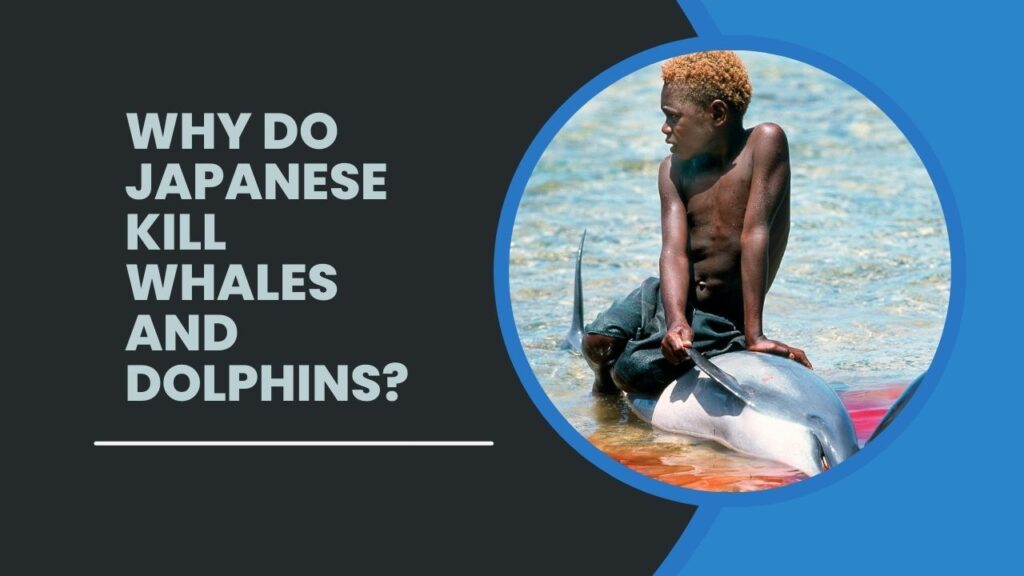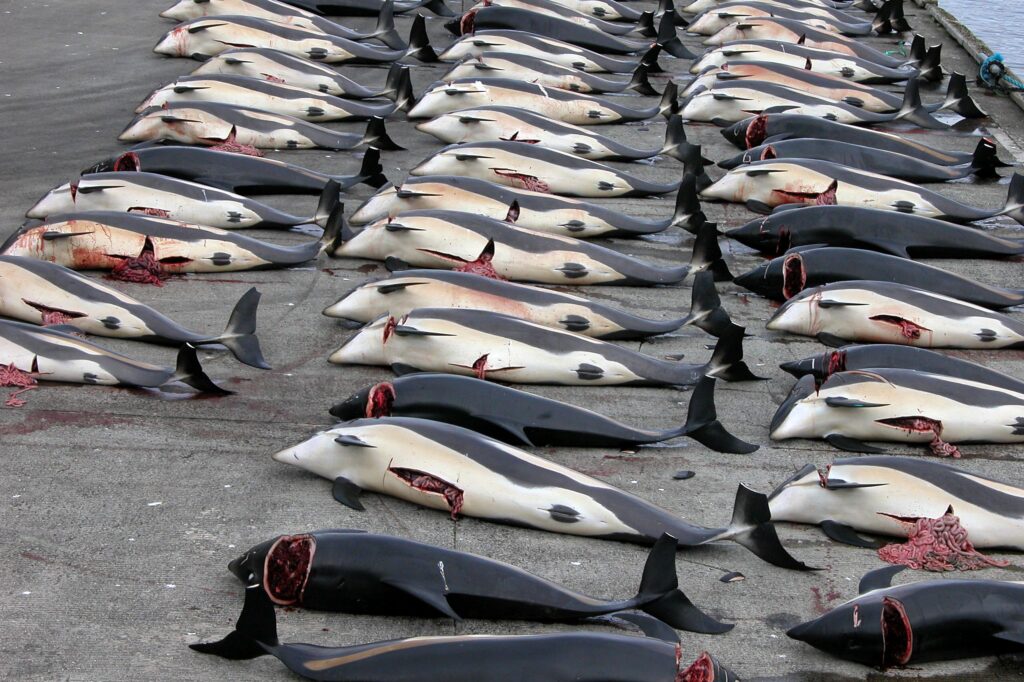
Why Do Japanese Kill Whales And Dolphins? Japanese kill whales and dolphins due to cultural practices and commercial interests. In Japan, whaling has a long history and is seen as a part of both traditional hunting and modern research.
Dolphins are occasionally killed for their meat and sometimes taken in captivity for aquariums and dolphin performances.
Environmentalists and animal rights advocates who support the preservation of these aquatic creatures have criticized these methods.
The amount of whales hunted in Japan has decreased recently as a result of worldwide pressure and whaling legislation.
However, the topic is still divisive and sparks discussions about cultural customs, environmental initiatives, and the humane treatment of marine life.
Table of Contents
Historical And Cultural Context
Japan’s history and cultural background are deeply ingrained in its whaling traditions and cultural practices.
Japanese mythology and history have placed a great emphasis on whales and dolphins, which has led to a deep respect for these aquatic animals. Whales had a revered status and were thought to be the gods’ messengers in the past.
The yearly whaling festivals and ceremonies that take place in different coastal villages are a reflection of this regard.
Nonetheless, it’s critical to recognize how Western culture influenced Japanese whaling methods. Japan began commercial whaling in the 19th century, emulating the success of the Western whaling business.
The extent of Japanese whaling increased as a result of a sharp increase in the market for whale products like meat and oil. The financial gains from whaling were a major factor in this change.
Japan continues limited whaling operations for cultural and scientific grounds despite mounting international condemnation and the global prohibition on commercial whaling.
Others support conservation and the preservation of endangered whale and dolphin species, while some contend that the cultural relevance of whaling practices should be honored.
The intricate intricacies surrounding Japanese whaling practices within their historical and cultural setting are highlighted by this ongoing dispute. [Why Do Japanese Kill Whales And Dolphins?]
See Also: Are Dolphins Whales? Dive into the Cetacean Mystery
Economic And Political Factors
One of the main reasons Japan still engages in dolphin hunting and whaling is their economic significance.
Japan has a long history of whaling, and it has long been considered an important source of food and cash.
Whale flesh and blubber have been used in the culinary, cosmetics, and pet food sectors, among other businesses.
In addition, the whaling and dolphin-hunting industries have benefited greatly from government assistance and subsidies.
The Japanese government has backed scientific whaling initiatives and given financial support to whaling enterprises.
Notwithstanding the drop in the market for whale goods and the mounting criticism from throughout the globe, this backing has allowed these practices to continue.
Japan’s position on whaling and dolphin hunting has also been impacted by global pressure and political factors.
International organizations dedicated to conservation and anti-whaling have criticized the nation and filed lawsuits against it.
Japan, however, has maintained that these customs are firmly ingrained in its cultural legacy and has resisted calls from other countries to outlaw them totally.
Notwithstanding growing international concerns about the protection of these marine species, these political and economic forces have contributed to Japan’s continued involvement in the whaling and dolphin hunting industries. [Why Do Japanese Kill Whales And Dolphins?]
See Also: Are Dolphins Whales Enemy? Revealing the Sinister Rivalry

Environmental Impact And Conservation Efforts
Japan’s whaling and dolphin-hunting practices have had a serious negative impact on marine environments.
The delicate balance of marine life has been upset by these operations, which have put some species in danger of extinction.
As apex predators, whales are essential to the upkeep of the food chain and the control of other marine organism populations.
When they are eliminated from the environment, more small marine species may proliferate, which could cause imbalances and even the collapse of some ecosystems.
Recent years have seen attempts to save these marine mammals through international collaboration and conservation programs.
Regulations and conservation efforts have been greatly aided by a number of organizations, including the International Whaling Commission and the Convention on International Trade in Endangered Species of Wild Fauna and Flora (CITES).
To safeguard these animals and maintain maritime environments, international prohibitions have been placed on the commercial whaling and dolphin hunting industries. [Why Do Japanese Kill Whales And Dolphins?]
Ethical And Moral Considerations
Why do Japanese kill whales and dolphins? There are moral and ethical issues raised by this question that need to be addressed.
The main topics of discussion around this practice are ethical considerations and worries about animal welfare.
Many contend that it is cruel and against the ideals of animal rights to murder these sensitive, intellectual beings.
With growing international condemnation of Japan’s whaling and dolphin hunting activities, public opinion has also changed over time.
It’s crucial to remember that there are other hunting techniques that might be investigated. These substitutes might offer a more morally and environmentally responsible means of satisfying dietary and cultural requirements.
It could be able to strike a compromise between ethical treatment of marine life and cultural customs by taking these choices into consideration. [Why Do Japanese Kill Whales And Dolphins?]
| Traditional hunting practices | Alternatives |
| Whaling | Adopting non-lethal research methods |
| Dolphin hunting | Promoting responsible dolphin watching tourism |
See Also: Is It Legal To Eat Dolphin? Discover the Truth
Frequently Asked Questions On Why Do Japanese Kill Whales And Dolphins?
Why Do Japanese Kill Whales?
Japanese kill whales for cultural, scientific, and commercial purposes. It is rooted in traditional practices, scientific research, and economic needs.
Do Japanese Eat Dolphins And Whales?
Yes, some Japanese people eat dolphins and whales. [Why Do Japanese Kill Whales And Dolphins?]
Why Are Dolphins And Whales Killed?
The main causes of dolphin and whale deaths are hunting and fishing activities, including as whaling, dolphin drive hunts, and unintentional entanglement in fishing gear. These actions disturb marine ecosystems and put their populations in jeopardy.
Are Dolphins Still Being Slaughtered In Japan?
Yes, despite protests and calls for their protection from throughout the world, dolphins are being killed in Japan. This approach still sparks a lot of controversy and casts doubt on conservation efforts and animal welfare.
Conclusion
In summary, cultural customs, financial gain, and the conviction that research is vital are the driving forces behind Japanese whaling and dolphin killing.
Japan keeps up these practices in spite of criticism from around the world, however with certain restrictions.
The contentious topic of conservation is still being debated, with proponents arguing for increased public awareness and conservation actions to safeguard these imperiled marine animals.

Mr. Das, a certified pharmaceutical scientist, holds a Bachelor of Science in Pharmaceutical Sciences and passionately contributes to dolphin conservation as a member of the committee in Bangladesh.


